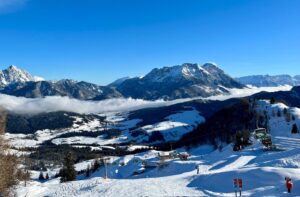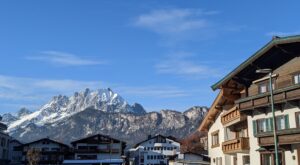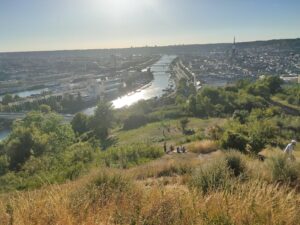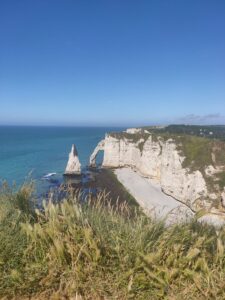Schlagwort: ‘Medicine’
My practical year in St. Johann in Tirol, Austria
- Medicine
- Austria, St. Johann in Tirol
- Bezirkskrankenhaus St. Johann in Tirol, department of “Allgemein- und Viszeralchirurgie”
- 11/2022 – 01/2023

© Angela Kurz
Preparation
I applied around ten months before the start of the Practical Year (called Praktisches Jahr (PJ) in Germany or Klinisch Praktisches Jahr (KPJ) in Austria). However, most places at the hospital “Bezirkskrankenhaus St. Johann in Tirol” are already taken one and a half to two years in advance, so it makes sense to call first and ask if there are still places available. The contact person is the “Sekretariat Ärztliche Direktion”, whose contact details can be found on the hospital’s website. They will also tell you which documents you need for the application. The hospital is a teaching hospital of the Universities of Innsbruck and Vienna. I would recommend contacting Ms. Lemos, the coordinator for study abroad of the medical faculty of the RWTH Aachen University, in time for necessary formalities.
Accommodation
There is a house right next to the hospital where students who are interns at the hospital can stay for free. Each student has their own room and bathroom. The kitchen is shared and is a great meeting place for communal meals and game nights. You also get free breakfast, lunch, and dinner from the hospital. However, the number of rooms is limited, so you should register for this in time. Since there wasn’t a room available at first, I lived in an apartment in the neighbouring town for the first two weeks. Then I was able to move into the student house for the remaining time. I would recommend checking regularly with the secretary’s office, as there are often vacancies in the house at short notice. I found support in finding a private apartment at the secretary of the hospital and the tourism association (Tourismusverband St. Johann in Tirol), each of which sent me a list of contact details of private landlords via e-mail.
Traineeship
On the first day of my internship, I had some organisational tasks to do: I reported to the secretary’s office, received work clothes, a staff ID card, and keys. Then I introduced myself to the surgical department. The working day began daily at 7.15 a.m. with the morning meeting. Afterwards, we medical students took some blood samples on the ward or assisted in the operating theatre. The rest of the time we accompanied the doctors in the surgical outpatient department. The day ended around 4 pm after the X-ray discussion and the ward rounds – on Fridays, usually a little earlier. As a medical student at the hospital in St. Johann, you do two night shifts a month, one during the week from 4 pm until the next morning and one on the weekend. The tasks include taking blood samples, setting up intravenous lines and assisting in the operating theatre if necessary or helping in the emergency room. I would recommend rotating also to orthopaedics/trauma surgery as part of the surgical tertial if possible.

© Angela Kurz
Free time
The region around St. Johann in Tirol is situated in the middle of the mountains and offers many great leisure opportunities. There are many ski resorts nearby, e.g. St. Johann itself, Kitzbühel, Saalbach/Hinterglemm or Ellmau/Scheffau. In some of them you even get a discount with your employee ID card! In other seasons, of course, there are also wonderful hikes to be done. The cities of Kitzbühel, Innsbruck and Salzburg are also not far away. In December, the Kitzbühel Christmas Market is definitely worth a visit!
Conclusion
I really enjoyed my time in St. Johann in Tirol and can recommend a PJ tertial in this great area. I made many new friends, and we made great memories together in the hospital and during our weekends in the mountains.
My practical year in France
- Staatsexamen, Medizin
- Rouen, France
- Hôpital Charles-Nicolle de Rouen
- May 2022 – September 2022
Preparation
The preparation began about a year before I started my Practical year (Praktisches Jahr- PJ). For the registration and application, I contacted Ms. Watteel directly, who is responsible for Erasmus stays at Université de Rouen Normandie. She was my contact person during the entire Erasmus stay and took care of all formal requirements and certificates in a timely manner.
Housing
Accommodation can be found at leboncoin.fr (something like Ebay in Germany) or Facebook. There is also the possibility to apply for student residences, but I did not do this. Furthermore, there are many real estate companies in Rouen that rent both furnished and unfurnished apartments. It should be noted that if the apartment is rented through a company, a fee of approximately one month’s rent must be paid. For students, the right side of the city is warmly recommended, because most of the activities and parties are on this side of the city. There are good bus connections to other parts of the city, but they are very limited at night. The university hospital is located almost in the city center and is easily accessible by public transportation.
Job and everyday life

© Lara Gubeljak
I completed a PJ tertial in the clinic for general surgery (chirurgie digestive). There I was in the OR every day and was allowed to assist most of the time, be it directly on the patient or administering the instruments. There were many opportunities for me to actively participate. I found it very good that I was allowed to sew up, that I could participate in organ donations, and that I was also able to perform some tasks beyond the student tasks. A normal day started at 7:30 a.m. and ended between 4:00 p.m. and 6:30 p.m. The visceral surgery team was very nice and had a lot of patience, especially when I occasionally didn’t understand things because of the language barrier. There were some doctors who also explained things in English, although this is not the rule in France.
For the internship, you get a reimbursement of about 250€ per month, but you must check with the HR department often and have a French bank account. All students who are currently doing their internship in a surgical department share the 24 hour duties among themselves. These services are additionally paid but are not obligatory for exchange students. During the night duty you have to do instrumentation and assist in the OR. You get your own room with your own DECT phone. If you are lucky and there are no emergencies, you may (and should!) sleep.
Leisure

© Lara Gubeljak
I was very fortunate to have a large circle of friends in Rouen, which made the stay overall very social and gave a different perspective to the busy PJ. It is very common to end the evening in a bar or café, although it must be said that due to the early working hours this was often not possible. Rouen is a student city and there is always something going on. In summer there are concerts every Thursday, there is the daily Cathederal de Lumiere, which was exciting every time again. It is a beautiful city from the Middle Ages, so there is a lot of history to see. The numerous museums are free until the age of 26. The surrounding cities like Paris, Le Havre, Étretat or Vernon are very worth seeing and easy to reach by train.
Conclusion
Rouen should and can definitely be recommended for tourism as well as for the PJ. I learned a lot there, was able to do a lot of practical work and strengthened many social skills in the professional setting. The beginning of the PJ was very exhausting, because a lot of things happened very quickly in the hospital and the medical terminology is clearly different, plus it contains many abbreviations. It was a great opportunity to deepen my French and to get an insight into general surgery. Four months were enough to settle in well and to get a little insight into the rest of Normandy.

